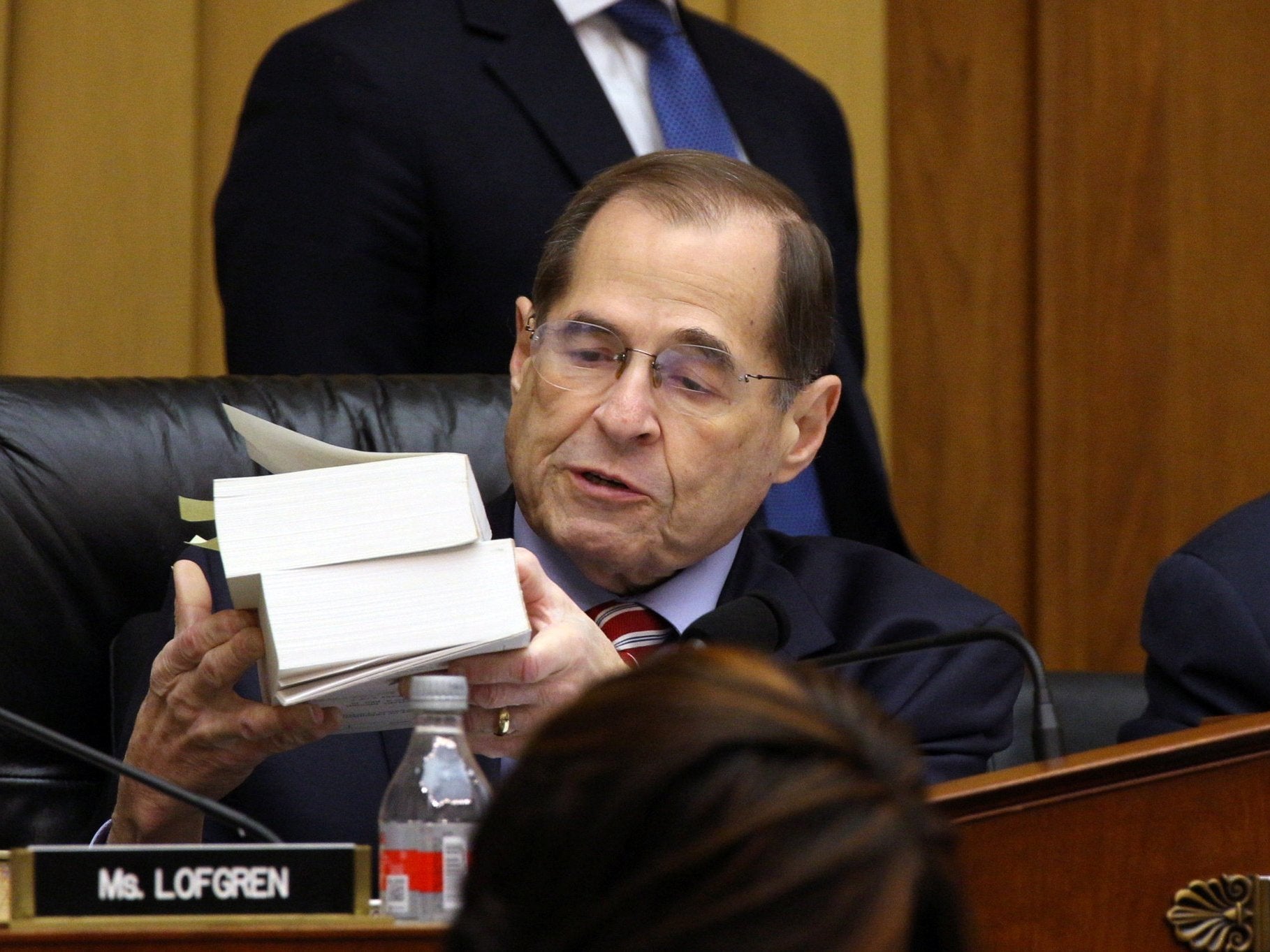Mueller report: Congress votes to subpoena release of entire document after Trump’s attorney general ignores deadline
The chairman of the Judiciary Committee says he will give the attorney general some time to submit the report to congress before using the subpoena power

Your support helps us to tell the story
From reproductive rights to climate change to Big Tech, The Independent is on the ground when the story is developing. Whether it's investigating the financials of Elon Musk's pro-Trump PAC or producing our latest documentary, 'The A Word', which shines a light on the American women fighting for reproductive rights, we know how important it is to parse out the facts from the messaging.
At such a critical moment in US history, we need reporters on the ground. Your donation allows us to keep sending journalists to speak to both sides of the story.
The Independent is trusted by Americans across the entire political spectrum. And unlike many other quality news outlets, we choose not to lock Americans out of our reporting and analysis with paywalls. We believe quality journalism should be available to everyone, paid for by those who can afford it.
Your support makes all the difference.A powerful House of Representatives congressional committee has voted to subpoena the justice department for special counsel Robert Mueller’s full report and its underlying evidence on the Trump campaign’s ties to Russia, in an escalation of tensions that sets the stage for fresh conflict between congress and the president.
In addition to the Mueller report, the Wednesday vote also authorises judiciary committee chairman Jerry Nadler to subpoena several high-ranking former White House officials.
Those former officials include communications director Hope Hicks, strategist Steve Bannon, counsel Don McGahn, deputy counsel Ann Donaldson, and the president’s former chief of staff Reince Priebus. Their testimony could provide valuable insight into the inner workings of the Trump White House during the first two years of the administration, when Mr Trump repeatedly blasted the Russia investigation as a “witch hunt” and admitted to firing former FBI chief James Comey over the issue.
The Wednesday subpoena vote comes just a day after attorney general William Barr ignored a Democrat-set deadline to hand over the report to congress, and just weeks after Mr Mueller delivered his report to the Justice Department.
In a controversial letter to congress two days after receiving the report, Mr Barr declared that the investigation found no evidence of collusion between Mr Trump’s campaign, and said that the Justice Department had decided against charging the president for obstruction.
Mr Trump and his allies, soon after the letter was made public, touted Mr Barr’s decision as proof that he and his campaign had done nothing wrong – and argued that the findings validated his frequent claims that the Russia investigation was a partisan effort to derail his presidency undertaken by salty Democrats who could not get past a shocking 2016 electoral defeat. Since then, Mr Trump has hedged when it comes to releasing the report publicly, saying that no amount of evidence would ever satisfy his political enemies.
“I think it is ridiculous, we went through two years of the Mueller investigation. We have, not only that, you read the wording. Who could go through that and get ‘no collusion,’ ‘no nothing’? So there’s no collusion, the attorney general now, and the deputy attorney general ruled no obstruction. So there’s no collusion, no obstruction, and now we’re going to start this process all over again?”, Mr Trump said on Tuesday when asked about Democrat efforts to make the report fully available to congress.
But Democrats, outraged by Mr Barr’s decision to give Mr Trump a pass – the report specifically said it did not “exonerate” Mr Trump, but did not provide a recommendation for charges – had immediately begun to question what evidence Mr Barr and the department may have ignored when he decided not to move forward with any charges. On Wednesday, Mr Nadler recognised that Mr Barr could still be working on further disclosures.
“I will give [Barr] time to change his mind,” Mr Nadler, a Democrat from New York, said during the committee hearing, indicating he plans on giving the attorney general the opportunity to send the report on his own accord. “But if we cannot reach an accommodation, then we will have no choice but to issue subpoenas for these materials.”
Republicans on the committee expressed outrage by the proceedings, suggesting that it would be illegal for Mr Barr to give congress an unredacted report and accusing Democrats of using the proceedings as a political prop.
“The attorney general didn’t comply with the democrat’s arbitrary 2 April demand deadline because he can’t comply. Because the law precludes him from complying. Because the attorney general wasn’t going to commit crimes to comply with that deadline,” said Representative John Ratcliffe, a Texas Republican and staunch supporter of Mr Trump. “The attorney general has promised to provide as much transparency as he possibly can but I’m afraid that’s never going to be good enough for some in here.”
The subpoenas, if used, are likely to set off a series of legal battles between the Justice Department, congress, and the White House.
While those former top White House officials are no longer employed by the executive branch, it is likely that the West Wing might argue in favour of executive privilege to keep sensitive information from getting to congress. Meanwhile, the Mueller report itself could contain any number of details that the Justice Department may find necessary to protect from being made public.
Subscribe to Independent Premium to bookmark this article
Want to bookmark your favourite articles and stories to read or reference later? Start your Independent Premium subscription today.
Join our commenting forum
Join thought-provoking conversations, follow other Independent readers and see their replies
Comments